The Candidates on Foreign Policy
- Joe Biden
- Mike Bloomberg
- Cory Booker
- Pete Buttigieg
- Julián Castro
- Tulsi Gabbard
- Kamala Harris
- Amy Klobuchar
- Beto O'Rourke
- Bernie Sanders
- Elizabeth Warren
- Andrew Yang
Joe Biden 
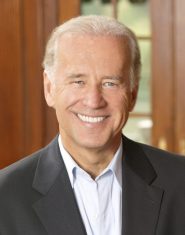
“No army on earth can match the electric idea of liberty. We must once more harness that power and rally the free world to meet the challenges we face today.” — Vice President Joseph Biden
At a Glance | Ending Endless Wars | Nuclear Weapons | Iran | Pentagon Spending & Diplomatic Funding | Korean Peninsula | Israel/Palestine
At a Glance
Vice President. Thirty-six years on the Senate Foreign Relations Committee, twelve as Chairman or ranking member. During his time in office, Biden has met with hundreds of world leaders and traveled to dozens of trouble spots across the globe. No candidate can compete with Joe Biden’s depth of experience. But for pro-peace voters concerned about endless U.S. military interventions, Biden’s experience — backing some of the most harmful foreign policies of the last half century — is as much a liability as an asset.
Biden first ran for Senate in 1972 as a dove, calling for the immediate withdrawal of U.S. forces from Vietnam. Since then, he’s mixed pro-peace votes such as his opposition to the 1991 Gulf War, with supporting U.S. military interventions in Kosovo, Iraq and Afghanistan. Biden’s track record reflects the foreign policy establishment’s faith in U.S. military interventions while periodically working to trim the sails of some of the excesses of that approach. In fact, Biden, alongside the Clintons and former Secretary of State Madeleine Albright, are key architects of “liberal internationalism.” The “liberal internationalists” support international cooperation and institutions while still grounding their policies in American exceptionalism and U.S. military might. Much of the foreign policy problems facing the U.S. today can be traced to these policies: the eastward expansion of NATO, the Iraq war, a outsized Pentagon budget, and a morphing war on terrorism.
Biden played a unique and critical role in the fateful decision to go to war in Iraq, the decision that most embodies the period of endless wars the country is in. As chair of the Senate Foreign Relations Committee, he held hearings that only heard from witnesses that supported the false narratives about Iraq’s WMDs or ties to al Qaeda. Biden himself at the time said that weapons of mass destruction “must be dislodged from Saddam, or Saddam must be dislodged from power,” and that “if we wait for the danger from Saddam to become clear, it could be too late.” He also went on major talk shows to point to the hearings as proof of WMDs and to proclaim on Meet the Press, “We have no choice but to eliminate the threat. This is a guy who’s an extreme danger to the world.”
In the White House, Biden sometimes took up Obama’s left flank opposite more hawkish voices like Hillary Clinton. He opposed a troop surge in Afghanistan while promoting a “counterterrorism plus” approach based on drone strikes and special forces, he opposed the Libya intervention, and he opposed arming the Syrian rebels. Other times, Biden took the more hawkish position. He encouraged Obama to bomb Syria after Assad was accused of using chemical weapons there, and encouraging Obama to send lethal aid to Ukraine after the Russuan annexation of Crimea. In both cases Obama said no. You can find his thoughts, comments, and plans on issues of war and peace below.
Ending Endless Wars
- In July Biden gave a speech pledging to “end the forever wars” and “bring the vast majority of troops home” from the middle east wars.
- Bringing most of the troops home obviously leaves the door open to a residual force that would as Biden put it “narrowly focus our mission to defeat al Qaeda and ISIS” in the region. This seems like a new articulation of the approach Biden has long supported in Afghanistan based on drone strikes, special forces and airpower, an approach he advocated as Vice President calling it “counterrorism plus”.
- Biden says he will not “hesitate to protect the American people, including when necessary, by using force.” He praises “the strongest military in the world” and commits to ensure “it stays that way”.
- Biden has said he will end the U.S. support for the Saudi-led coalition in Yemen’s tragic war.
- About Venezuela, Biden has said “I was among the first Democratic foreign policy voices to recognize Juan Guaidó as Venezuela’s legitimate leader and to call for Maduro to resign. Maduro has used dialogue in the past as a tactic to delay action and concentrate power, so the U.S. should maintain sanctions pressure until negotiations produce results.”
Nuclear Weapons
- In a speech in January 2017, Biden said “In a world possessed of nuclear technology, the effective minimum number of bombs is small. Even one can cause hideous damage. With that knowledge—over the course of decades—we negotiated agreements to reduce and control the world’s supply of nuclear weapons.”
- At the same speech at the end of the Obama administration, Biden signaled support for a No First Use (NFU) policy for nuclear weapons saying: “Given our non-nuclear capabilities and the nature of today’s threats—it’s hard to envision a plausible scenario in which the first use of nuclear weapons by the United States would be necessary. Or make sense. President Obama and I are confident we can deter—and defend ourselves and our Allies against—non-nuclear threats through other means.”
- Biden told a voter at a campaign event, that he opposed the Trump administration’s plans to develop low-yield, “more usable” nuclear weapons.
Iran
- In 2007, amidst talk of war with Iran during the Geroge W. Bush administration, Biden warned the administration about going to war with Iran without Congressional approval: “I want it on the record, and I want to make it clear,” Biden said. “If he does, I will move to impeach him.”
- Biden supports returning to the Iran deal “if Iran comes back into compliance”. He goes on to say he would “work with our allies to strengthen and extend it while more effectively pushing back against Iran’s destabilizing activities which we are allowed to do and we had partners to do with us.
- Biden was one of the Obama administration’s most important advocates for the Iran nuclear deal. He was responsible for selling the deal to wary Democrats in Congress as well as more hawkish members of the Jewish community.
Pentagon Spending & Diplomatic Funding
- Biden has called for rebuilding the State Department noting the vacancies under the Trump administration.
Korean Peninsula
- When President Trump met with Kim in June, Biden blasted the move in a campaign statement, “Diplomacy is important, but diplomacy requires a strategy, a process and competent leadership to develop. We still don’t have a single commitment from North Korea. Not one missile or nuclear weapon has been destroyed, not one inspector is on the ground. If anything, the situation has gotten worse. North Korea has continued to churn out fissile material and is no longer an isolated pariah on the world stage.”
- After Biden accused president Trump of embracing “tyrants like [Vladimir] Putin and Kim Jong-un”, the Korean Central News Agency went off in a statement the way only the North Korean government can: “What he uttered is just sophism of an imbecile bereft of elementary quality as a human being, let alone a politician. He has been accused even within the Democratic Party,… for his vulgar acts and words about women. [H]e is self-praising himself as being the most popular presidential candidate. This is enough to make a cat laugh.” These statements reveal resentment over the Obama administration’s sanctions policies as well as perhaps an attempt to curry favor with Trump.
Israel/Palestine
- Biden’s campaign has said that he “would not move the American embassy back to Tel Aviv” But that he would “re-open our consulate in East Jerusalem to engage the Palestinians.. and also return the United States to the effort of encouraging a two-state solution — the only way to truly guarantee Israel’s long-term security as a Jewish and democratic state and meet the legitimate aspirations of the Palestinians for a state of their own.”
- Biden has criticized the notion of being “even-handed” with Israel and the Palestinaians saying: “In my 34-year career, I have never wavered from the notion that the only time progress has ever been made in the Middle East is when the Arab nations have known that there is no daylight between us and Israel. So the idea of being an ‘honest broker’ is not, as some of my Democratic colleagues call for, the answer. It is being the smart broker, it is being the smart partner.”
- In July, Biden said “sustaining our iron-clad commitment to Israel’s security regardless of how much you may disagree with this present leader. It is essential.”
- Biden has opposed settlements and raised concerns about the occupation, “I think occupation is a real problem, a significant problem. I think the settlements are unnecessary. The only answer is a two-state solution, number one. Number two: the Palestinians have to step up to stop the hate. So, it’s a two-way street.”
Mike Bloomberg — withdrew

“This war must come to an end. But it is crucial that we end it in a wise, thoughtful and deliberative way.” — Mayor Michael Bloomberg
At a Glance | Ending Endless Wars | Nuclear Weapons | Iran | Pentagon Spending & Diplomatic Funding | Korean Peninsula | Israel/Palestine
At a Glance
Billionaire media mogul Mike Bloomberg is positioning himself as a moderate alternative to Joe Biden. In 2001, Bloomberg became the three-term mayor of New York City. During his Republican, and eventually Independent, tenure, he fervently supported Wall Street, implemented the heavily-criticized “stop-and-frisk” program, and subjected the city’s Muslims to an expansive surveillance program. He was also a staunch advocate for the misguided Iraq War – a stance he recently said he does not regret.
After leaving office, he used his fortune on political activism, including in helping Democrats nationwide win political office and fighting climate change and gun violence. Since joining the Presidential race in late November, Bloomberg’s self-funded campaign has already spent $409 million to raise his profile. You can find his thoughts, comments, and plans on issues of war and peace below.
Ending Endless Wars
- In 2003, Bloomberg used his platform as mayor of the largest U.S. city to not only support the invasion of Iraq, but to propagate the lie that Saddam Hussein was involved in the attacks on 9/11. He later stood with the Bush administration against those asking to set a timetable for troop withdrawal.
- Bloomberg has talked about a drawdown of the U.S. troop presence in Afghanistan, but believes that some unspecified number of forces should remain in order to fight Al Qaeda and ISIS. He also believes that the U.S. should provide Afghanistan not only with development assistance, but also security assistance.
- He believes that U.S. special operations forces in Iraq and Syria have been an effective counter to ISIS and criticized Trump’s decisions to withdraw those forces.
Nuclear Weapons
- Bloomberg advocates for the renewal of the New START Treaty, the INF Treaty, and other nonproliferation agreements with Russia.
Iran
- Though Bloomberg initially came out against the Iran nuclear deal as not being strict enough on Iran, he has criticized Trump’s withdrawal from the agreement and says he will re-enter it and add on to it.
- He believes the recent U.S. airstrike on Iranian Qassem Soleimani was both legal and justifiable, alleging an imminent threat despite a challenge of that view by numerous intelligence sources.
Pentagon Spending & Diplomatic Funding
- Bloomberg has called on the Pentagon to “introduce greater rationality and discipline into its budgeting process,” and discussed the need to refocus spending on electronic, cyber, and space weaponry, as well as artificial intelligence.
- He disagrees with Trump’s funding cuts to diplomacy and foreign aid, and has promised to increase funding to the State Department and U.S. Agency for International Development (USAID).
Korean Peninsula
- Bloomberg plans to pursue an interim agreement to work toward total denuclearization of North Korea. He is in favor of “quiet, sustained and firm diplomacy” in coordination with not only Asian allies like Japan and South Korea, but also other bordering powers like China and Russia.
- He plans to calibrate sanctions relief based on North Korea’s behavior.
Israel/Palestine
- While officially supporting a two-state solution for Israelis and Palestinians, his motivation is solely Israel’s security. He also opposes moving the U.S. embassy out of Jerusalem and has denounced the boycott, divestment, and sanctions (BDS) movement.
- Bloomberg is a major proponent of Israel and its current Prime Minister Benjamin Netanyahu – going so far as to fly to Tel Aviv in 2009 and 2014 to support Israel’s military assaults on Gaza.
Cory Booker — withdrew
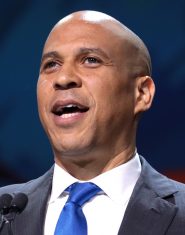
“President Trump’s actions have been detrimental to global stability and maintaining peace in the world, and have left the American people worse off and at greater risk.” — Senator Cory Booker
At a Glance | Ending Endless Wars | Nuclear Weapons | Iran | Pentagon Spending & Diplomatic Funding | Korean Peninsula | Israel/Palestine
At a Glance
Cory Booker began his political career in 1998 as a city councilman in Newark, New Jersey, fighting to highlight urban development issues by going so far as to stage a hunger strike and live in a tent in the crime-ridden parts of the city. He later served seven years as mayor of Newark, where his hands-on approach to governing had him shoveling snow, adopting stray dogs, and carrying a neighbor out from a house fire.
In 2013, Booker was elected to the Senate. He has sat on the Senate Foreign Relations Committee since 2017, where he has been increasingly critical of the Trump administration’s foreign policy. He views post-WWII support for democratic growth around the world as the greatest U.S. foreign policy achievement, and the Iraq War as the biggest mistake.
The Senator’s official presidential platform states that he “will lead with our values, stand with our allies and partners…and confront 21st century challenges.” You can find his thoughts, comments, and plans on issues of war and peace below.
Ending Endless Wars
- Booker’s platform includes a broad call for “responsible and comprehensive strategy for military operations that recognizes the constitutional requirements for congressional authorization.” This likely incorporates his stance that a congressional debate and vote on an Authorization for the Use of Military Force (AUMF) against ISIS is a priority.
- He believes that “there is no military solution to the conflict” in Afghanistan, and that only a “diplomatic surge” can deliver peace and reconciliation. He has advocated for bringing the troops home from Afghanistan, saying “we cannot have forever wars in this nation.” During the second Democratic debate, Booker would not commit to a first year deadline for withdrawal, however, citing fears of leaving a vacuum that would foster terrorism.
- He has criticized U.S. airstrikes in Syria, but has also warned against Trump’s proposed withdrawal of troops from the country, calling it “reckless and dangerous.”
- He has condemned U.S. involvement in the brutal Saudi intervention in Yemen, voting to end military support and consistently voting to block arms sales to Saudi Arabia. He has called to “reexamine that entire relationship” and to hold the Saudis and Emiratis accountable for their many atrocities.
Nuclear Weapons
- During the first Democratic debates, Booker listed “nuclear proliferation” alongside climate change as the biggest threats facing the U.S.
- When asked at a May town hall about extravagant nuclear spending plans, Booker discussed budgetary waste broadly and added, “For us to be pulling out of nuclear treaties, even with our adversaries and the Russians is unacceptable to me.”
Iran
- Booker believes it is “absolutely clear [that] the 2001 AUMF does not grant the President authority to strike Iran — for that, he must go to Congress. Any military action in Iran that circumvents Congressional approval is a blatant and unconstitutional power grab.”
- While voting in favor of the Iran Nuclear Agreement in 2015, Booker did so believing the deal to be “deeply flawed” and also suggested that lack of Iranian compliance could be addressed using more sanctions or even “coordinated military action by the United States, Israel and other allies.”
- Despite critiquing President Trump’s withdrawal from the Iran Nuclear Deal, Booker was the only candidate who wouldn’t commit to reentering the agreement during the first Democratic debate, stating, “We need to renegotiate and get back into a deal, but I’m not going to have a primary platform to say unilaterally I’m going to rejoin that deal. Because when I’m president of the United States, I’m going to do the best I can to secure this country and that region and make sure that if I have an opportunity to leverage a better deal, I’m going to do it.” This position plays into problematic narratives that the Iran agreement was not good enough, and that a better deal is achievable.
Pentagon Spending & Diplomatic Funding
- Despite voting against this year’s bloated Pentagon budget, Booker has consistently voted in favor of previous defense spending bills, including the behemoth $717 billion bill of FY 2019.
- He supports a well-funded State Department, believing funding for diplomacy, development, and foreign aid strengthen the U.S.
Korean Peninsula
- Booker has denounced President Trump’s “lack of planning, preparation, and forethought” with regards to North Korea, believing that the U.S. has made major concessions without receiving anything concrete in return.
- He believes our main goal “has to be the full denuclearization of the Korean peninsula. A nuclear North Korea is among our greatest national security threats…” In terms of policies to realize these goals, though, Booker has only spoken broadly about working “closely with our allies to develop and execute a thoughtful strategy to denuclearize the peninsula and address international concerns with the DPRK’s missile program and proliferation activities.”
Israel/Palestine
- While officially supporting a two-state solution for Israelis and Palestinians, Booker has called himself a “staunch advocate for a strengthened relationship with Israel,” often pushing to expand U.S. defense support and cooperation.
- In moves approved by his biggest donor – a pro-Israeli PAC aligned with the American Israel Public Affairs Committee (AIPAC) – Booker: “praised Israel on the Senate floor” in 2014 at a time when thousands were being killed in the Gaza conflict; supported efforts to denounce the Obama administration’s abstention on a U.N. Security Council resolution critical of Israeli settlements in 2017; and discussed at this year’s AIPAC conference his desire to create a “unified voice from Congress” against the boycott, divestment, and sanctions (BDS) movement.
Pete Buttigieg — withdrew
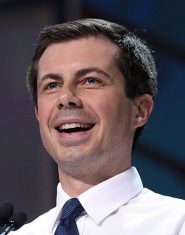
“War itself represents a kind of failure, and true success lies in preventing conflict.” — Mayor Peter Buttigieg
At a Glance | Ending Endless Wars | Nuclear Weapons | Iran | Pentagon Spending & Diplomatic Funding | Korean Peninsula | Israel/Palestine
At a Glance
Mayor of South Bend, Indiana since 2012, Pete Buttigieg spent his early career as a consultant in Washington D.C., briefly working with the Kerry and Obama campaigns. He enlisted in the Navy Reserve in 2009, and served six months in Afghanistan as an intelligence officer focused on blocking terrorist finance networks in 2014.
Though his political record does not provide concrete actions in relation to foreign policy, an early glimpse of Buttigieg’s vision is on display in his academic record: his Harvard thesis highlights the connection between religious texts and the notion of American exceptionalism to critique U.S. militarism in Vietnam and Iraq.
Since announcing his presidential run, Mayor Pete has called for the urgent “need to fundamentally rethink our foreign policy to help America lead and shape a better world for our future.” You can find his thoughts, comments, and plans on issues of war and peace below.
Ending Endless Wars
- Buttigieg has consistently stated that “we must put an end to endless war and refocus on future threats,” and that “correcting this is not only a matter of presidential restraint but of renewed Congressional oversight.”
- He believes Congress has shirked its constitutional authority and is long overdue to repeal the 2001 Authorization for the Use of Military Force and debate our overseas entanglements.
- At the second Democratic debate, he vowed to withdraw troops from Afghanistan within his first year if elected. “We have to,” he declared.
- He would end U.S. military support for the Saudi-led coalition’s assault on Yemen, and “would suspend all arms sales to Saudi Arabia that could be used in the Yemen war, but also cut off the spare parts and maintenance for equipment needed to prolong that war.”
- He stresses that military force should only be used as a last resort in the face of an attack or imminent threat to the U.S., its citizens, or allies bound by treaty or as part of a UN-organized international coalition to prevent genocide.
- Buttigieg has opposed Trump’s “saber-rattling” in Venezuela, and has offered one of the most articulate critiques of the use broad based coercive sanctions saying: “broad economic sanctions, such as those pursued by the Trump administration, run the risk of hurting innocent Venezuelans already face crippling food and medicine shortages and enabling the Maduro regime to promote the false narrative that the U.S. is responsible for the country’s misery.”
Nuclear Weapons
- Buttigieg has said, “Among the threats to American and human security, nuclear destruction remains paramount. This is why preventing the spread of nuclear weapons should remain a core tenet of our global leadership.” He accordingly supports nuclear nonproliferation agreements and negotiations.
- However, when pressed about his stance on no first use at a July event, Buttigieg professed that the U.S. needs to maintain deterrence, expressing worry that “depending on how it’s phrased, no first use could actually lead to more proliferation” while not further elaborating how.
Iran
- Buttigieg opposes taking military action against Iran, and is “extremely concerned” that the Trump administration’s escalations could “[start] a chain reaction that even the White House can’t stop.”
- He believes the Iran Nuclear Deal served in our national security interest, and has vowed to reenter the agreement if elected.
- Additionally, he supports negotiating a separate deal with Iran in regards to its support for groups like Hezbollah and its human rights record.
Pentagon Spending & Diplomatic Funding
- While Buttigieg has not made statements on the top-line of the military budget, he has discussed the need to prioritize investment in cyber defenses, artificial intelligence, and machine learning over weapons of conventional wars such as submarines and warships.
- He views diplomatic, development, and security assistance as vital to deploy alongside troops.
Korean Peninsula
- Buttigieg believes that advancing diplomacy on the Korean Peninsula cannot occur through a “zero-sum insistence on full and complete denuclearization before any peace is possible.”
- He recognizes that both sides need to take concrete steps toward securing peace, and welcomes approaches that would incorporate North Korea into the international community and focus on taking small steps toward bigger gains.
- Simultaneously, he believes sanctions should remain and be lifted in a targeted manner in exchange for substantive and verifiable reversals in North Korea’s nuclear program.
Israel/Palestine
- While supporting a two-state solution for Israelis and Palestinians, Buttigieg has previously implied that much of the misery in Gaza is the fault of Hamas, and has said that U.S. support for Israel’s security will continue to be a fundamental tenet of U.S. foreign policy if elected.
- However, he also disagrees with the policies and human rights record of the current Israeli administration, and declared that “if Prime Minister Netanyahu makes good on his promise to annex West Bank settlements, he should know that a President Buttigieg would take steps to ensure that American taxpayers won’t help foot the bill.
Julián Castro — withdrew
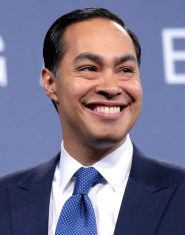
“We get stronger and safer the more that we exercise our soft power, and not necessarily our military power.” — Secretary Julián Castro
At a Glance | Ending Endless Wars | Nuclear Weapons | Iran | Pentagon Spending & Diplomatic Funding | Korean Peninsula | Israel/Palestine
At a Glance
Julián Castro grew up with politics; his mother founded a political party to raise Mexican-American voices and his math teacher father was an involved community activist. After a brief stint in law, he joined the San Antonio City Council in 2009, going on to become a three-term mayor in 2009. In 2014, he joined the Obama administration as Secretary of Housing and Urban Development.
Castro’s political record does not provide concrete actions in relation to foreign policy, and his presidential campaign has prioritized domestic over foreign policy. He has, however, strongly critiqued the Trump administration’s damage to our global alliances.
The former Secretary recently expressed his broad take on foreign policy, “The country has a role to lead for the values that we believe in, for freedom, democracy, and opportunity. That doesn’t mean that we entangle ourselves in wars…However, we need to reclaim our role as the world leader in standing up for things like human rights around the world.” You can find his thoughts, comments, and plans on issues of war and peace below.
Ending Endless Wars
- Castro recognizes that the U.S. military needs to get out of Afghanistan, but is not committed to a particular approach or timeframe. He advocates for withdrawal “in a way that is orderly, that respects our allies, that leaves the region as stable as we possibly can, given the circumstances.”
- He believes troops should leave Syria, and is “not a big fan of the commitments America has made, over these last 15 years.” Simultaneously, he was against President Trump’s previous attempt, calling it erratic and saying that “once you’re there, you have to actually have a solid plan for how you’re going to withdraw.
Nuclear Weapons
- When asked about a no first use policy at a July town hall, Castro said that he supports “working toward the end of nuclear weapons” and “no more proliferation,” and that he would look more into no first use specifically.
Iran
- Castro has criticized the Trump administration for being “hellbent on moving us toward war with Iran.”
- He has called the Iran Nuclear Deal “a landmark achievement that prevented a nuclear-armed Iran for more than 3 years,” and vowed to reenter the agreement if Iran complies with it.
Pentagon Spending & Diplomatic Funding
- Castro called President Trump’s 4th of July military parade a “waste of money.”
Korean Peninsula
- Castro has said he would be willing to speak with adversaries, but has criticized President Trump’s approach with North Korea as lacking substance, being “all for show,” and legitimizing a dictator.
Israel/Palestine
- Castro favors a two-state solution for Israelis and Palestinians, and faults the Trump administration as enabling Benjamin Netanyahu’s “reckless” promise to annex the West Bank if re-elected.
Tulsi Gabbard — withdrew

“It must be our mission, to ensure that the 21st century will forever be known as the turning point in human history, that era in which the world’s great powers chose to abandon the path to confrontation and war and agreed to pursue the path of cooperation, diplomacy, and peace.” — Representative Tulsi Gabbard
At a Glance | Ending Endless Wars | Nuclear Weapons | Iran | Pentagon Spending & Diplomatic Funding | Korean Peninsula | Israel/Palestine
At a Glance
In 2002, at just 21 years old, Tulsi Gabbard became the youngest person elected to Hawaii’s legislature. She stepped down two years later to deploy with her Army National Guard unit to Iraq, during which time one of her responsibilities was checking the injury and casualty lists of the war. She served another 12-month tour in Kuwait in 2009, where she trained counterterrorism units. Upon her return, she was elected to the Honolulu City Council and then the U.S. House of Representatives in 2013.
Gabbard is a staunch anti-interventionist consistently challenging U.S. regime change wars, including through her position on the House Armed Services Committee. Her motivation appears straightforward: “I have seen this cost of war firsthand, which is why I fight so hard for peace.” However, she is not one to shy away from military intervention targeting “Islamic extremism” – proudly professing herself a hawk “when it comes to the war against terrorists” and even suggesting that torture is worth employing in some scenarios.
The Congresswoman has vowed, “As president, I will lead this country to bring about a bold change in our foreign policy that bends the arc of history away from war and towards peace.” You can find her thoughts, comments, and plans on issues of war and peace below.
Ending Endless Wars
- Gabbard states she would “end the wasteful regime-change wars that have taken such a toll on our troops and on the American people.” Accordingly, in the Democratic debates, she said that “we can’t keep U.S. troops deployed in Afghanistan,” and vowed to withdraw them within her first year if elected.
- However, Gabbard does not oppose all military action. She resolutely believes that “we need to focus all of our efforts and energy on that direct threat [of Islamic extremism].” Accordingly, when asked about her opposition to U.S. involvement in Syria, she was quick to clarify that she was against supporting moderate rebels fighting the Assad government, not those fighting ISIS.
- This position has led her to praise Russian President Vladimir Putin’s bombing of ISIS in Syria; personally meet with Syrian President Bashar al-Assad and denounce his opponents as no different than ISIS; and celebrate the “great courage and leadership” of Egyptian President Abdel Fattah el-Sisi in “taking on…extreme Islamist ideology” during a visit to Cairo. She also favors “surgical strikes” and “limited use of drones” in the fight on terrorism.
- She has condemned and voted to end U.S. support of “Saudi Arabia’s genocidal war in Yemen,” also saying we “stop pretending that [the Saudis are] our allies” and recognize that “they are fueling and funding terrorist groups in Yemen.”
Nuclear Weapons
- During the first Democratic debates, Gabbard said the biggest threat facing the U.S. “is that we are at greater risk of nuclear war.”
- She believes Trump’s withdrawal from the INF Treaty is fueling a “new Cold War” and worsening the “nuclear arms race.”
Iran
- Gabbard adamantly opposes a war with Iran, warning that the “cost in money and lives will be catastrophic” and much greater than that of wars in Iraq, Afghanistan, and Syria.
- While voting in favor of the Iran Nuclear Agreement in 2015, Gabbard did so “not because it’s a great deal, or even a good deal” but only because she saw no better option and found comfort in the fact that the “deal does not prevent the United States from taking unilateral or cooperative action against Iran…Nothing in this agreement limits our ability to enact sanctions, nor does it take the military option off the table.” She also consistently supported legislation undermining the negotiation process leading up to the deal.
- Despite saying “the Iran deal is far from perfect,” Gabbard did critique President Trump’s withdrawal as damaging to U.S. credibility – particularly in regards to negotiations with North Korea – and feared it would increase the chance of Iran restarting its nuclear program.
Pentagon Spending & Diplomatic Funding
- Gabbard frequently brings up the financial costs of war, pointing out in the Democratic debates that, particularly in Afghanistan, “we are spending $4 billion dollars…every single month, rather than ending that war, bringing our troops home and using those precious resources into serving the needs of the people here in this country.”
- Nonetheless, her voting record on defense spending bills has been hit and miss, with her supporting numerous bloated budgets for the Pentagon.
Korean Peninsula
- Gabbard advocates for engagement with North Korea without preconditions, using the 2018 false alarm incident in Hawaii to stress the need for negotiations toward denuclearization of the Korean peninsula.
- She believes a long history of interventionism by the U.S. “has led North Korea to develop and tighten their grip on nuclear weapons,” and rightly worries that President Trump’s threats toward Venezuela and Iran undermine the diplomatic process.
Israel/Palestine
- While officially supporting a two-state solution for Israelis and Palestinians, Gabbard spoke at a 2015 conference of Christians United for Israel, an organization that supports Israeli settlement and whose founder John Hagee has taken Isamophobic stances and written about launching a “theological war” against “global shari’ah.” She also supported 2017 legislation that promoted a U.S. veto on issues related to Israeli settlements.
- She criticized Israel for its use of live ammunition in Gaza in May 2018.
- When the Trump administration cut off aid to the West Bank and Gaza, she joined in urging the release of withheld assistance.
- This June, she voted for a resolution opposing the boycott, divestment, and sanctions (BDS) movement. When challenged by constituents about her vote she said, “I voted for H.Res.246 because I support a two-state solution…I don’t believe BDS will accomplish that” and said that the resolution “does not in any way limit of hinder our First Amendment rights.” She also cited her cosponsorship of Rep Ilhan Omar’s bill that affirms that Americans have the right to boycott foreign countries.
Kamala Harris — withdrew
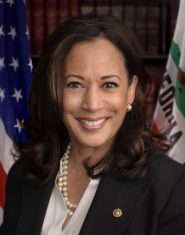
“On Day One, I would make it very clear that I value the importance of diplomacy. I value relationships. And that doesn’t take any strength from us, any power from us—it gives us power.” — Senator Kamala Harris
At a Glance | Ending Endless Wars | Nuclear Weapons | Iran | Pentagon Spending & Diplomatic Funding | Korean Peninsula | Israel/Palestine
At a Glance
Kamala Harris, born in Oakland, California, has a long history as a prosecutor. She began her law enforcement career as a deputy district attorney for Alameda County before being elected District Attorney of San Francisco, and eventually Attorney General of California. Following the retirement of Senator Barbara Boxer, Harris ran for the U.S. Senate, defeating congresswoman Loretta Sanchez to become the third female Senator from California. You can find her thoughts, comments, and plans on issues of war and peace below.
Ending Endless Wars
- Harris cosponsored and voted for S.J.Res. 7, legislation directing the president to withdraw U.S. military support for the war in Yemen, stating on Twitter, “What’s happening in Yemen is devastating. Thousands of children have died and last year alone, the war killed on average 100 civilians a week. Enough is enough. I voted YES today on a resolution to end the United States’ support for the Saudi-led coalition’s war in Yemen.”
- She has consistently voted to block arms sales to Saudi Arabia since the start of its brutal intervention in Yemen.
- She has said that she would remove most U.S. troops from Afghanistan, but maintains the need for a continued U.S. military presence in order to support the Afghani government.
Nuclear Weapons
- Harris voted against the 2018 defense budget, and explained her vote by stating, “I cannot support the Administration’s request for new, unchecked powers to develop and administer a low-yield nuclear weapons program. The development of these weapons will make us less safe by increasing the likelihood of a nuclear escalation.”
- When pressed at a July event about no first use, she instead discussed Trump’s failures in regards to Iran and North Korea.
Iran
- While Harris has said she would rejoin the Iran Nuclear Deal if elected, she has also made statements about expanding it in order to cover testing of ballistic missiles, which would in fact mean working out a different agreement.
Pentagon Spending & Diplomatic Funding
- During her time in the Senate, Harris has typically voted against defense spending bills.
Korean Peninsula
- In 2018, Harris signed a letter to President Trump that stated he did not have the authority to preemptively strike North Korea without congressional approval.
- Despite consistently critiquing the Trump administration’s approach to North Korea, she has failed to articulate an alternative vision for a peace process.
Israel/Palestine
- Harris has been a vocal supporter of Israel, stating, “as long as I’m a United States senator, I will do everything in my power to ensure broad and bipartisan support for Israel’s security and right to self-defense.”
- She opposes the Boycott, Divestment and Sanction movement (BDS) but voted against The Strengthening America’s Security in the Middle East Act. The act provided legal justifications for targeting the BDS movement. Harris opposed the act not because she supported BDS, but because of the First Amendment issues presented by the act.
Amy Klobuchar — withdrew

“This president is literally, every single day, 10 minutes away from going to war, one tweet away from going to war…I don’t think we should be conducting foreign policy in our bathrobe at 5 in the morning,” — Senator Amy Klobuchar
At a Glance | Ending Endless Wars | Nuclear Weapons | Iran | Pentagon Spending & Diplomatic Funding | Korean Peninsula | Israel/Palestine
At a Glance
Amy Klobuchar became Minnesota’s first female senator in 2007, winning her election by a landslide and famously getting $17,000 in donations from calling up ex-boyfriends – she has visited each of her state’s 87 counties since. Labeling herself the “senator next door,” she points to the 24 bills of hers that have become law under this administration as evidence of her bipartisanship.
She states that President Trump’s approach to foreign policy oftentimes places us on the brink of war and believes we deserve better. Her foreign policy record in office generally aligns with the diplomatic path.
The Senator has made clear during her campaign that she would change things: “I don’t think we should be conducting foreign policy in our bathrobe at 5 in the morning,” You can find her thoughts, comments, and plans on issues of war and peace below.
Ending Endless Wars
- Running up to her 2006 Senate win, Klobuchar heavily criticized the Iraq War, rightly pointing out that it “formented terrorism” and calling for diplomatic solutions: “While I support the invasion of Afghanistan, I disagreed with the decision to invade Iraq.” “This war has basically devolved into a civil war. We have to realize that this solution isn’t going to be more boots on the ground, it’s going to be a diplomatic and political solution. This war, as of Thanksgiving, will have lasted longer than World War II. So I believe that we need to bring people together and help this country to come up with a diplomatic and political solution in addition to giving them the tools that they need.” She also opposed President Bush’s plans for troop surges in Iraq, and consistently voted against escalation.
- Since the start of Saudi Arabia’s brutal assault on Yemen, Sen. Klobuchar has consistently voted to block U.S. arms sales to kingdom. She also supported legislation directing President Trump to withdraw U.S. military support for the war in Yemen, expressing that she was “deeply concerned that the President continues to ignore human rights violations, the suppression of dissent, and the deaths of thousands of civilians in Yemen in order to maintain good relations with the Saudis.”
- On the other hand, she has taken hawkish stances occasionally. She supported the ill-fated intervention in Libya, justifying it because it had international involvement. She also endorsed arming of Syrian rebels and advocated for the establishment of no-fly zones there. A few months ago, she voted in opposition to Trump’s proposed withdrawal of troops from Syria, as well.
Nuclear Weapons
- When asked about a U.S. policy of no first use at a July event, Klobuchar responded that she would “look at the Senate bill.”
- She joined in calling on President Trump to preserve the Intermediate-Range Nuclear Forces (INF) Treaty after his announcement to abandon it.
- In 2010, Sen. Klobuchar was one of the 71 Senators who voted for the New Strategic Arms Reduction Treaty (New START), and has since called on President Trump to extend the agreement before its expiration.
Iran
- Klobuchar rightly fears that the “Administration’s reckless policies increase the risk of armed conflict” with Iran and “isolate the U.S.” She makes it very clear that President Trump “can’t draw us into war” without Congressional authorization.
- She was an early supporter of the Iran Nuclear Agreement, publicly defending it as the best option in an op-ed titled “Why I Am Supporting the Iran Nuclear Agreement” shortly after it was presented to Congress. She favors reentering the agreement, though she referred to the deal as imperfect and said “I would have worked to get longer sunset periods, and that’s something we can negotiate to get back in the deal” at the first Demcratic debates.
Pentagon Spending & Diplomatic Funding
- Despite voting against this year’s bloated Pentagon budget, Klobuchar has consistently voted in favor of previous defense spending bills, including the behemoth $717 billion bill of 2019.
- She has vowed to “invest in diplomacy and rebuild the State Department,” and “believes that we need to stand strong — and consistently — with our allies.”
Korean Peninsula
- Klobuchar has expressed willingness to negotiate with North Korea on denuclearization and said it’s “always good to talk to people when you’re dealing with something so important as nuclear weapon[s]…” but is concerned that this administration’s approach has no clear focus, goals, or path and President Trump “keeps having these summits and meetings that really don’t produce anything.”
- She implied “we should be upping the sanctions and putting more pressure on Kim Jong Un” in response to the recent rounds of missile tests.
Israel/Palestine
- Earlier this year, Klobuchar denounced Prime Minister Benjamin Netanyahu’s political alliance deal with the extremist, anti-Arab Otzma Yehudit party, and recently said his talk of annexing the Golan Heights and settlement policies are “setting us back” on the path to a two-state solution for Israelis and Palestinians, which she supports.
- She joined in opposing the Trump administration’s decision to cut off aid to the West Bank and Gaza.
- In moves that live up to her title of “champion of the U.S.-Israel alliance” by the American Israel Public Affairs Committee (AIPAC), Klobuchar: boasts about her steadfast support of military aid for Israel, which includes a massive 2016 deal for $38 billion over 10 years; calls the boycott, divestment, and sanctions (BDS) movement harmful and voted for anti-BDS legislation; and supported efforts to denounce the Obama administration’s abstention on a U.N. Security Council resolution critical of Israeli settlements in 2017.
Beto O’Rourke — withdrew
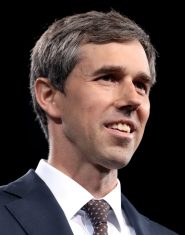
“I think the much tougher but far more important work to do is to lead with diplomacy, holding the card of military involvement as the last resort. Unfortunately, for far too long, we’ve led militarily and then tried belatedly to follow that up with diplomacy.” — Representative Robert O’Rourke
At a Glance | Ending Endless Wars | Nuclear Weapons | Iran | Pentagon Spending & Diplomatic Funding | Korean Peninsula | Israel/Palestine
At a Glance
Beto O’Rourke is a former U.S. Congressman who gained notoriety at the national level after a valiant, but unsuccessful, campaign to represent the state of Texas in the U.S. Senate. In defeat, he received more votes than any Democratic candidate for Senate in Texas history.
During his time in the U.S. House of Representatives, O’Rourke served on the House Armed Services Committee and the Subcommittees on Emerging Threats and Capabilities as well as Strategic Enforcement.
O’Rourke has stated that U.S. foreign policy should be to “[f]ind a way to work with allies and partners and in some cases with our enemies.” You can find his thoughts, comments, and plans on issues of war and peace below.
Ending Endless Wars
- O’Rourke maintains the need for congressional authorization to declare and end wars, arguing, “This country has completely forgotten its constitutional responsibility to lawfully declare and end these wars, as prescribed in the first article of the U.S. Constitution.”
- He vowed that “[a]s President, I will end our “forever wars,” repair our strained relationships with our traditional allies, and make the decision to put our service members in harm’s way only when absolutely necessary.”
- He has committed to withdrawing all troops from Afghanistan by end of first term, adding, “Working with our allies and partners, I will phase troop withdrawal to minimize known risks, while at the same time doing what we can to ensure a sustainable peace, including prioritizing participation by Afghan women in the peace process and reintegrating former fighters into the new Afghan society.”
- He called for accountablility regarding Saudi Arabia, specifically for their involvement in Yemen and their role in the murder of reporter Jamal Khashoggi.
Nuclear Weapons
- In his announcement speech, O’Rourke listed the pursuit of nuclear disarmament needs to be among the priorities of the next administration.
- While in Congress, he opposed an amendment that would limit funding for the implementation of the New START Treaty.
- He voted to remove language from the defense spending bill that would prevent the dismantling of retired nuclear warheads.
Iran
- O’Rourke has accused the Trump administration of “gunning for war with Iran,” warned that we “have someone in Bolton, who has publicly said that he wants regime change in Iran,” and reaffirmed the need for Congressional debate on issues of war and peace.
- He was a vocal supporter of the Iran Nuclear Deal, stating that, “without firing a single shot, without sacrificing the life of a single U.S. service member, it was able to stop the country of Iran from pursuing nuclear weapons.”
- He argued that while the Iran Nuclear Deal was “imperfect” it was the “best path to keep Iran from having nuclear weapons” and stated that if elected, he would rejoin the agreement.
Pentagon Spending & Diplomatic Funding
- O’Rourke has proposed an alternative way of funding U.S. war efforts. In his proposal, whenever the U.S. enters into a new war a “war tax” would be put in place to help fund it. This tax would have progressive rates with homes that make $200,000+ paying $1,000 and homes making $30,000 or less paying only $25 a year.
Korean Peninsula
- O’Rourke stated that he would be willing to consider all diplomatic options, including economic sanctions, to avoid war and further nuclearization of the Korean Peninsula.
Israel/Palestine
- O’Rourke was one of only eight members of the U.S. House of Representatives to vote against the funding of Israel’s Iron Dome missile defense system. The bill passed the House by a margin of 395-8.
- He called the U.S. – Israel relationship “One of the most important relationships we have on this planet,” but goes on to say that the relationship must “be able to transcend a prime minister who is racist,” referring to Israeli Prime Minister Benjamin Netanyahu.
- He condemned President Trump’s 2018 decision to move the U.S. Embassy to Jerusalem, calling it, “absolutely unnecessarily provocative,” but recently ruled out moving the embassy back to Tel Aviv if elected.
Bernie Sanders — withdrew

“A sensible and effective foreign policy recognizes that our safety and welfare is bound up with the safety and welfare of others around the world. Every person on this planet shares a common humanity. We all want our children to grow up healthy, to have a good education, have decent jobs, drink clean water and breathe clean air, and to live in peace. That’s what being human is about.” — Senator Bernard Sanders
At a Glance | Ending Endless Wars | Nuclear Weapons | Iran | Pentagon Spending & Diplomatic Funding | Korean Peninsula | Israel/Palestine
At a Glance
Mayor Bernie Sanders, from his office in Burlington Vermont in the mid-80s, worked to oppose the imperialist interventions of the Reagon era. He visited Nicaragua and spoke out against U.S. intervention as well as championing a city referendum opposing U.S. support for the brutal military regime in El Salvador. In May of this year, after the New York Times wrote an article detailing his anti-imperialist beginnings that some pundits tarred as a gotcha “anti-American baiting” “hit piece,” Sanders told the Times, “I plead guilty to, throughout my adult life, doing everything I can to prevent war and destruction.”
Sanders has been an outspoken critic of U.S. intervention throughout his political career. He was vigorous and prescient in his opposition to the Iraq war. He correctly predicted the precedent the war set for other interventions in the Middle East, the astronomical costs, and the “unintended consequences” in terms of civil war and destabilization. Sanders also saw the importance of not antagonizing Russia by expending NATO eastward, “Since the Cold War is over,” Sanders asked on the floor of Congress in 1997, “why are we militarily provoking Russia?” Much of the current tensions with Russia can be tied to this ill-fated decision.
However, Sanders has not always voted against U.S. interventions. He supported the U.S. bombing operation in Kosovo and voted for the 2001 Authorization of Use of Military Force after the 9/11 attacks (as did every member of Congress other than Barabra Lee.) Sanders also co-sponsored a Senate resolution that urged “the United Nations Security Council to take such further action as may be necessary to protect civilians in Libya from attack, including the possible imposition of a no-fly zone.” After the Libya intervention began Sanders was less sanguine, telling FOX news “Everybody understands Gadhafi is a thug and murderer. We want to see him go, but I think in the midst of two wars, I’m not quite sure we need a third war, and I hope the president tells us that our troops will be leaving there, that our military action in Libya will be ending very, very shortly.”
Sanders ran a campaign in 2016, very much focused on domestic issues, but he did work to open up debates about regime change wars including in Libya, and on what he called Israel’s disproportionate attacks on Gaza in 2014 and the need for a more “even-handed” U.S. policy on Israel and the Palestinian terrotories. You could see the beginnings of Sanders staking out a more progressive worldview on foreign policy.
But in his 2020 campaign Sanders has outlined a bold new foreign policy vision. He speaks to foreign policy issues arguably more than any other candidate with the exception of his fellow opponent of change wars Tulsi Gabbard. He has gone directly after the militarist habits of the U.S. attacking “mindset” that “military force is decisive in a way that diplomacy is not.” Returning to his anti-interventionist roots, in a major foreign policy speech at Westminster College, he laid out the history of disastrous U.S. interventions that prove that it is a myth that “a “benevolent global hegemony” is the goal of our foreign policy.” He instead calls for “global engagement based on partnership, rather than dominance” based on international cooperation and international institutions like the U.N.
Ending Endless Wars
- Sanders has made “ending endless wars” the centerpiece of his foreign policy platform. In a Foreign Affairs article outlining this platform, Sanders wrote “But just to end our military interventions in these places is not enough. We need to rethink the militaristic approach that has undermined the United States’ moral authority, caused allies to question our ability to lead, drained our tax coffers, and corroded our own democracy. We must never again engage in torture or indefinite detention, and we must limit the use of drone strikes that too often result in high numbers of civilian casualties, boosting the very terrorist organizations that we aim to defeat. And we must seriously reinvest in diplomacy and development aid, both of which have been allowed to atrophy under the current administration.”
- Sen. Sanders spearheaded the campaign to pass S.J.Res. 7, legislation directing the president to withdraw U.S. military support for the war in Yemen, and has spoken out repeatedly on the floor of Congress and in the media in support of ending U.S. involvement in the war in Yemen. This legislation passed in both chambers of Congress, marking the first time Congress has successfully sent legislation invoking the War Powers Act to the president’s desk, and advancing the broader goal of Congress reclaiming its constitutional authority over war. President Trump vetoed the legislation. Despite failing to become law, efforts to pass this legislation have significantly increased public scrutiny of the war in Yemen. These efforts have also made a difference for civilians on the ground in Yemen by pressuring the Saudi-led coalition and helping negotiators secure ceasefire agreements that reduce violence and increase access to humanitarian aid.
- Sanders has consistently called for troops to come home from Iraq and Afghanistan including during the Bush and Obama administrations.
- Sanders has opposed military intervention in Venezuela saying that “the United States has got to work with the international community to make sure that there is a free and fair election in Venezuela.” Sanders has been harshly critical of Venezuelan president Nicolas Maduro’s policies but pointedly declined to call Maduro a dictator. Sanders also refused to recognize Juan Guiadó, who is backed by the Trump administration, as the legitimate leader of Venezuela. Sanders also points to the long U.S. history of intervention in Latin America as a cautionary tale. Sen. Sanders has cosponsored S.J.Res. 11, legislation to block funding for military action against Venezuela without congressional approval.
Nuclear Weapons
- When asked if he would be “capable of using nuclear weapons in defense of the country,” Sanders response was rightly indignant: “The real question is: How the hell do we get rid of these nuclear weapons that are threatening the entire planet? And I would be aggressive in doing that…Right now, we have a president who wants to spend more and more money on the military and more money on nuclear weapons…I want to see us be aggressive in bringing the world together again to figure out how we can substantially not only reduce military spending worldwide, but how we can reduce the ongoing and long-term threat of nuclear weapons.”
Iran
- Sanders has campaigned against a possible war with Iran consistently writing and appearing on TV to feature his opposition to war with Iran. Sanders has said: “Let me be very clear, I will do everything I can to prevent a war with Iran which would be far worse than disastrous war with Iraq.”
- Sanders has consistently supported the Iran Nuclear Agreement, and has said he will reenter the agreement if elected president as long as Iran continues adhering to the terms of the agreement.
Pentagon Spending & Diplomatic Funding
- Sanders kicked off his campaign at a rally where he called for reinvesting Pentagon spending in human needs: “Today, we say to the military-industrial-complex that we will not continue to spend $700 billion a year on the military — more than the next 10 nations combined,” the White House hopeful told the crowd. “We’re going to invest in affordable housing, we’re going to invest in public education, we’re going to invest in rebuilding our crumbling infrastructure — not more nuclear weapons and never-ending wars.”
- In 2001, after 9/11, Sanders supported a 50 percent cut for the Pentagon.
- Sanders has been by far the candidate most willing to actually vote against Pentagon spending; he has only voted for 3 out of 19 military spending bills since 2013.
- Sanders been willing to bend on military issues when they impact Vermont, drawing criticism for complaining about the high cost of the F-35 fighter jet while supporting basing the F-35 in his home state.
Korean Peninsula
- After the widely-panned Hanoi summit between Trump and Kim, Sanders said: “Even though the Hanoi summit failed, the United States should continue diplomatic efforts with North Korea, and support the people of South Korea as they seek to end the conflict with the North.” Sanders has been one of the few democrats to keep advocating for diplomatic progress instead of just trying to score political points when Trump’s erratic approach to diplomacy inevitably stumbles.”
- Sanders has echoed the peace communities call for a lasting peace agreement saying, “ A peace agreement is the best path for American security, and for the security of the region.”
Israel/Palestine
- In August, Sanders broached using US aid to Israel to push for better Israeli policies saying: “The United States government gives a whole lot of money to Israel, and I think we can leverage that money to end some of the racism that we have recently seen in Israel.”
- Despite being willing to take pro-peace stands on Israel Sanders calls himself a “defender of Israel.” He has strongly opposed the BDS movement (while opposing efforts to decriminalize it) and has said there is “absolutely” anti-semitism in the BDS movement. He has signed on pro-Israeli government letters in Congress such as a 2017 letter to the UN secretary General accusing the UN of using its “privileged platform to advance an anti-Israel agenda”.
- Sanders has called Israel’s use of force in the 2014 war in Gaza “disproportionate” and “indiscriminate.”
- Speaking about the shootings of protesters in Gaza in 2018, Sanders said “Innocent people are being killed. Those are terrible actions. Instead of applauding Israel for its actions, Israel should be condemned.”
- Sanders has acknowledged that the U.S. is complcit with the occupation of the Palestinian terrirtories, and that the U.S. is to quick to take the Israeli side, saying, “Certainly the United States is complicit, but it’s not to say … that Israel is the only party at fault … in terms of Israeli-Palestinian relations the United States has got to play a much more even-handed role. Clearly that is not the case right now.”
- Sanders coauthored a letter to Secretary of State Pompeo asking the U.S. to “do more to alleviate the ongoing humanitarian crisis in the Gaza Strip.” The letter calls for funds to rebuild Gaza, ease the blockade, and restore US funds to UNRWA (United Nations Relief and Works Agency for Palestine Refugees in the Near East).
Elizabeth Warren — withdrew
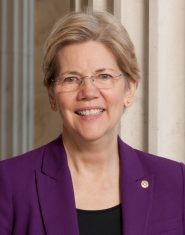
“We need to refocus our international economic policies so that they benefit all Americans, not just wealthy elites. At the same time, we must refocus our security policies by reining in unsustainable and ill-advised military commitments and adapt our strategies overseas for the new challenges we’ll face … It’s time to create a foreign policy that works for all Americans, not just the rich and powerful.” — Senator Elizabeth Warren
At a Glance | Ending Endless Wars | Nuclear Weapons | Iran | Pentagon Spending & Diplomatic Funding | Korean Peninsula | Israel/Palestine
At a Glance
Warren’s first foray as Senator on foreign policy mixed progressive instincts, her signature wonky bent, as well as cautious, conventional foreign policy thinking. In 2014, she gave a foreign policy speech at Georgetown University where she highlighted concern about the civilian casualties caused by U.S. wars. “It is critical to consider the chaos and factionalization that can arise in the wake of military intervention,” Warren told those gathered at Georgetown University, “it’s critical to evaluate the potential for military intervention to spark an insurgency or fuel a civil war, critical to consider the possibility that civilian casualties in one conflict could be used as a recruiting tool or rallying cry for extremists in other parts of the world.” While the speech was refreshing in its focus on civilian lives, it failed to address the U.S. drone program. You couldn’t be certain from that speech, whether Warren would stake out a truly progressive platform on foreign policy.
Time has moved on and so has Warren. Even in the early days, most of Warren’s foreign policy moves on controversial issues put her on the dovish end of the Democratic spectrum. She’s also chosen a few places to lead: her leadership on a nuclear “No First Use” policy became a flash point in one of the Democratic presidential debates. She’s articulated what she calls “a foreign policy for all” and made “ending endless wars” and cutting the “bloated Pentagon budget” a central part of her foreign policy platform. Warren does have her critics in the dove’s camp, some point to her conventional foreign policy campaign team, and her vote for drone-assassination champion, John Brennan, as CIA director. After a lackluster start, Warren has surged into the top tier of candidates, it will be interesting to watch her refine her foreign policy platform. You can find her thoughts, comments, and plans on issues of war and peace below.
Ending Endless Wars
- Warren wanted to end the Iraq war authorization as early as 2014, early in her Senate career. She supported a bill spearheaded by Senators Rand Paul and Kirsten Gillibrand to repeal the Iraq authorization of military force. Warren said at the time, “This bill is a reminder that Congressional authorization for the use of force should be limited and that military action is always a last resort.”
- Warren opposed arming the Syrian “moderate rebels” In another early vote, also in 2014, voting against the continuing resolution to fund the government because it authorized military aid to the rebels. Warren said, “I do not want America to be dragged into another ground war in the Middle East, and it is time for those nations in the region that are most immediately affected by the rise of ISIS to step up and play a leading role in this fight,”.
- With the Saudi-led intervention in Yemen, Warren was one of the war’s early opponents as one of 4 cosponsors of a 2017 resolution to block a key arms transfer to Saudi Arabia. She also supported Bernie Sanders’ legislation directing the president to withdraw U.S. military support for the war in Yemen. More recently, she picked up on reports that U.S. arms were finding their way to al Qaeda (through Saudi Arabia and the UAE), sending a letter to the Secretaries of State and Defense asking 13 pointed questions and publicizing the letter in the media.
- Warren has been clear about withdrawing troops from Syria and Afghanistan, even while Trump was getting panned by the media and many Democratic and Republican politicians about tweeting out a plan to withdraw troops from Syria. When asked about the president’s tweets Warren bluntly told Rachel Maddow, “I think it is right to get our troops out of Syria, and let me add, I think it is right to get our troops out of Afghanistan. I think those in the defense establishment, who are saying “no, no, no” we can’t get out need to explain what winning in those wars looks like.”
- Critics have pointed out that while she has opposed military intervention in Venezuela she has waffled on sanctions. She told the Huffington Post she opposed both sanctions and military force saying, “Instead of reckless threats of military action or sanctions that hurt those in need, we should be taking real steps to support the Venezuelan people.” But later when she was on Pod Save America supported sanctions as long as they were combined humanitarian aid. But aid would be less needed if it wasn’t for the harsh sanctions the U.S. is imposing.
- Warren does not share the same militarist paranoia about threats from China and Russia as the Trump administration but still talks of China and Russia as key competitors. She speaks of cooperating with those countries on issues like climate change. At the same time she looks at China and Russia as competitors who “hope to shape spheres of influence in their own image” and who are “working flat out to remake the global order to suit their own priorities.” It’s not clear how Warren would seek to address this competition. While she steers clear of articulating this as mainly a military competition, she has not articulated a strong vision of how diplomacy could address this rivalry.
Nuclear Weapons
- Warren’s leadership on the issue of a Nuclear No First Use policy has brought that issue to the presidential race in debates and on social media. She authored S. 272, legislation to establish No First Use of nuclear weapons as U.S. policy. A No First Use policy, where the U.S. pledges never to initiate a nuclear war, is seen by arms control advocates as immediately making the world safer and as a key step towards limiting the salience of nuclear weapons in U.S. defense posture.
- Warren laid out her opposition to the $1.2. Trillion update to the nuclear arsenal as well as her core principles on nuclear weapons as a centerpiece of her approach to foreign policy in her speech at American University. “One: No new nuclear weapons…Two: More international arms control, not less. We should not spend over a trillion dollars to modernize our nuclear arsenal, at a time when the President is doing everything he can to undermine generations of verified arms control agreements. Three: No first use.”
Iran
- Warren has consistently supported the Iran Nuclear Agreement, and has said she will reenter the agreement if elected president as long as Iran continues adhering to the terms of the agreement.
- Warren opposes military action against Iran without congressional approval and voted with all her Democratic colleagues to prevent funding to such action in the Senate defense budget bill.
Pentagon Spending & Diplomatic Funding
- Warren has made cutting the Pentagon budget a centerpiece of her foreign policy platform. In her speech at American University she said “Let’s cut our bloated defense budget. The United States will spend more than $700 billion on defense this year alone. That is more than President Ronald Reagan spent during the Cold War. …This is unsustainable. If more money for the Pentagon could solve our security challenges, we would have solved them by now.”
- Warren’s Senate voting record on defense bills has been mixed. In 2017, she voted for the National Defense Authorization Act (NDAA) touting that her legislation had been integrated into the so-called “must-pass” bill, including language from her bill on preventing civilian casualties. She also touted funding for military programs in Massachusetts. However, she voted against it both in 2018 and 2019.
- Yes, Elizabeth Warren has a plan to rebuild the State Department. After pointing out that the Pentagon is nearly 40 times bigger than the State Department and that we employ more people to work in military grocery stores than we do foreign service officers, Warren calls for a doubling of the size of the foreign service. She calls for growing the hiring poor for State to diversify our foreign service. She calls for greater career-long training for the U.S. diplomatic corps. She says she will end the practice of handing out Ambassadorships to wealthy donors.
- Warren also has a plan to go after the revolving door between contractors the Pentagon and military contractors. Warren’s plan would “ban giant defense contractors from hiring senior DOD officials and general and flag officers for four years after they leave the Department.” It would increase disclosure by Defense contractors about the true scope of their lobbying activities. Warren codifies her plan in her Department of Defense Ethics and Anti-corruption Act of 2019 introduced in the Senate this May.
- In line with this, Warren led a lonely charge against the nomination of Mark Esper as Defense Secretary, best known as the former top lobbyist for the huge defense contractor Raytheon. She grilled Esper about conflicts of interest in his confirmation hearing before being one of eight Senators to vote no.
Korean Peninsula
- Warren opposes a preventative military approach to North Korea and was one of only 3 Senate cosponsors of Senator Ed Markey’s “No Unconstitutional Strike Against North Korea Act of 2017”.
- While most Democrats panned the Singapore summit as an abject failure to achieve anything meaningful, Warren’s statement after the June 2018 Singapore supported diplomacy and went as far as saying “I want to see the president succeed”. But she balanced that with harsh criticism of Trump’s diplomatic prowess and North Korea’s past behavior. “Generations of North Korean leaders have made and broken promises before … We’re at the beginning of a diplomatic process that will require patience, experience, and close coordination with our allies. I want to see the President succeed, but a handshake is no substitute for a binding, verifiable deal.” Some peace advocates felt that Warren’s statement could have been more supportive of the historic summit.
Israel/Palestine
- In 2014, when voters were trying to get a sense for Elizabeth Warren’s take on foreign policy one of the first issues she spoke out on was Israel. During the 2014 Israeli war on Gaza, which led to the death of more than 2,200 Palestinians, many of them civilians, one of her constituents challenged her on sending military aid to Israel. Warren recited standard pro-Israeli government talking points saying that Hamas has attacked Israel “indiscriminately” — which is certainly true — but without noting Israel’s well-documented use of indiscriminate force.
- Also in 2014, Warren cosponsored the United States–Israel Strategic Partnership Act of 2014, an AIPAC-backed bill that codified Israel is a “major strategic partner”.
- She was one of 60 Democrats to boycott Israeli Prime Minister Benjamin Netanyahu’s address to a joint session of Congress, one of eight Senators to boycott the speech. She consistently opposed the AIPAC position on the Iran deal. In fact, Warren may have began to sour on uncritical support for Israel as part of the fight over the Iran deal.
- More recently a number of observers have seen a dovish shift in Warren’s positions on Israel including with her opposing the effort to criminalize BDS activity.
- In 2017 she criticized the Trump administration for recognizing Jerusalem as Israel’s capital and announcing the relocation of the U.S. embassy in Israel from Tel Aviv to Jerusalem.
- She opposed Israeli home demolitions in a letter to Netanyahu with 9 other liberal Senators, also in 2017.
- In April 2018, Warren was one of the few Senators criticizing Israel after Israeli forces shot dozens of Palestinian protesters in the Gaza Strip. “I am deeply concerned about the deaths and injuries in Gaza,” she said in a statement. “As additional protests are planned for the coming days, the Israel Defense Forces should exercise restraint and respect the rights of Palestinians to peacefully protest.”
Andrew Yang — withdrew
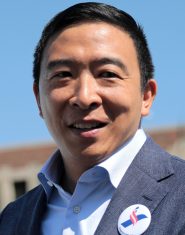
“My first principles concerning foreign policy are restraint and judgment – we should be very judicious about projecting force and have clear goals that we know we can accomplish.”— Andrew Yang
At a Glance | Ending Endless Wars | Nuclear Weapons | Iran | Pentagon Spending & Diplomatic Funding | Korean Peninsula | Israel/Palestine
At a Glance
Andrew Yang is an American entrepreneur who gained notoriety within the political sphere due to his work for various start-up companies such as Manhattan Prep and Venture For America. In 2015, Yang was honored by the Obama Administration as a “Presidential Ambassador for Global Entrepreneurship.” You can find his thoughts, comments, and plans on issues of war and peace below.
Ending Endless Wars
- Per Yang’s campaign website, he would “sign a repeal to the [Authorization for the Use of Military Force] AUMF, returning the authority to declare war to Congress, and refuse to engage in anything other than emergency military activity without the express consent of Congress.”
- One of the reasons that the 2001 and 2002 AUMF’s are still being used as a legal justification for military action is because there are no sunset provisions included in their language. If elected, Yang would push for a constitutional amendment that would require automatic sunset periods for laws unless they are evaluated by Congress and renewed.
- In May of 2019, Yang signed on to the “End The Forever War” pledge, stating, “We’ve continued in a constant state of war for the last seventeen years, and it has cost us tremendously in American lives as well as billions of dollars that could have been used to help families here at home.”
Nuclear Weapons
- Yang believes that having the power to launch a nuclear weapon shouldn’t be something left to the President alone. He believes that there should be a chain of command that can verify a nuclear decision. “A decision to launch nuclear weapons is too important to rest in any individual’s hands. We should ensure that any such decision is verified by the vice president or, if he or she is unavailable, the White House Chief of Staff.”
- According to his campaign website, Yang is looking to invest in counterproliferation efforts, including buying nuclear grade weapons materials from other countries for “exorbitant prices.”
Iran
- Like many of his Democratic counterparts, Yang is critical of President Trump’s handling of Iran, saying, “Escalating tensions with Iran are a massive move in the wrong direction – the American people have very low desire for another conflict in the region. I would re-enter the multilateral 2015 Iran agreement with the UK, France, Russia, and Germany and pursue diplomatic solutions.”
Pentagon Spending & Diplomatic Funding
- Yang would redirect around $60 billion from the Pentagon budget to a new “domestic infrastructure force” that he calls the Legion of Builders and Destroyers. The Legion would be tasked with a number of national infrastructure improvement projects and would have jurisdiction over local infrastructure regulators.
- He would appoint a Secretary of Cybersecurity in order to combat the growing online threats to American national security.
- According to his campaign website, an Andrew Yang Administration would undergo regular audits of the Department of Defense.
Korean Peninsula
- Following President Trump’s historic handshake meeting with Kim Jung-Un at the Korean demilitarized zone, Yang tweeted, “Anything that improves the political climate on the Korean peninsula and engages North Korea on its nuclear program is a good thing.”
Israel/Palestine
- He has said, “Israel is a very, very important ally of the U.S. Certainly some of the actions that are being taken there are deeply problematic and run afoul of some of the standards that we’d like to see countries meet. I’d be hesitant to say that they are in violation of those standards.”
Are you registered to vote? Click here to double-check or register.
Want to vote from the safety of your home? Click here to get your absentee ballot!

